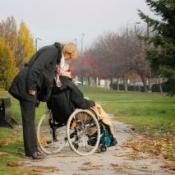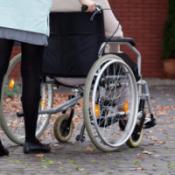 I remember the first time I saw all the medication bottles in Mark’s cabinet. We hadn’t been together long, and I was curious to learn more about the medication he was taking. I asked him about them and he said they were for seizures. I didn’t quite understand what he meant by this, but he said “it” was under control, so I didn’t give it much more thought. I thought it was great he was willing to share such sensitive and personal information, considering it was early in our relationship.
I remember the first time I saw all the medication bottles in Mark’s cabinet. We hadn’t been together long, and I was curious to learn more about the medication he was taking. I asked him about them and he said they were for seizures. I didn’t quite understand what he meant by this, but he said “it” was under control, so I didn’t give it much more thought. I thought it was great he was willing to share such sensitive and personal information, considering it was early in our relationship.
Mark began to have seizures in his late 20s that did not respond to medication. Even though they are of the complex partial kind (e.g.,“smaller seizures”), when I witnessed one for the first time, it scared me. He wasn’t able to speak while it was happening, and he made strange sounds in addition to awkward movements with his hands.
Little did I know at that time the impact it would have on our lives. When epilepsy is under control, you don’t think about it. But when it is out of control, causing six or eight seizures a day, you can’t help but think about all the time.
The Impact of Epilepsy on Our Lives
Gradually, the seizures got worse until it impacted his work, home, and personal life. At work, supervisors did not understand his behavior and, at one point, asked him to take a leave of absence. He missed opportunities for advancement due to his employer knowing he struggled so much with seizures, and because of this his focus was impacted. At one point, I even contacted an attorney who said nothing could be done unless Mark was fired for having seizures.
Mark could no longer drive, meaning I had to do it. This impacted me so profoundly that I became resentful, both with our relationship and with epilepsy. To me, it was the thief that took away my normally laid-back and smiling husband and took away parts of our relationship. He began to withdraw more and played video games for hours at a time, struggled to talk about “it” and his feelings, and lost the ability to focus on our relationship and look forward to our wedding and life after.
It became hard for me to cope. I had few friends and felt no one understood. How could they? No one I knew what I was going through. I didn’t want to go out much with him to social events, as I feared the embarrassing attention a seizure might attract. I hate to say that, but it’s how I felt at the time.
Once we moved out of state, Mark got better medication and his seizures have since been controlled.
Looking back, there is a lot I would have done differently. I waited too long to get Mark support from a therapist for his physical condition and for his emotional well-being, and waited too long to get couples counseling to help us manage the challenging realities of life with epilepsy, for both partners.
Recommendations for Caregivers for People with Epilepsy
I recommend caregivers seek support from as many friends, family, and neighbors as possible and reach out frequently. I wasn’t as willing to reach out to the few friends I had as I should have been, even though I felt isolated and alone.
I also think it’s helpful for caregivers to find some respite through social outings. Going out to dinner, a movie, or bowling can help you feel connected and replenish your emotional reserves.
Pursue local resources that may be available to you as well. For us, a support group for people with epilepsy and their loved ones would have made a world of difference. With the internet at our fingertips, resources including message boards and local support groups are much easier to find and participate in.
The Importance of Self-Care
I recommend caregivers take time for self-care: good eating habits, consistent exercise, plenty of restful sleep. I have learned that the more stressful the experience, the more self-care is needed to maintain good mental health. Find ways to relax through deep breathing, meditation, massage, and stretching. It can also be helpful to find a creative outlet through art, writing, or crafts.
Both people with epilepsy and those who support them can feel overwhelmed, hopeless, and helpless at times.
As a caregiver, it can be easy to allow resentment, guilt, or compassion fatigue to set in, but remind yourself that epilepsy impacts the whole family. It’s no one’s fault, and it’s no one individual’s problem. Like your loved one, you need to be cared for and supported through this difficult journey. The more you take care of yourself and get support, the better the caregiver you are able to be.
Lastly, maintaining a sense of humor through the experience is important. Epilepsy can take over your world like an unwelcome visitor and seemingly become the center of everything. Find what tickles your funny bone and come back to it as needed. Laughing reduces your stress response, relieves tension, improves your mood, and can make it easier to deal with difficult situations (Mayo Clinic Staff, 2016).
In closing, remember to keep the faith. Both people with epilepsy and those who support them can feel overwhelmed, hopeless, and helpless at times. Keep looking for support until you find it—from medical practitioners, from friends, from your community. Remember to support each other as well, because you’re in it together.
Reference:
Mayo Clinic Staff. (2016). Stress relief from laughter? It’s no joke. Retrieved from http://www.mayoclinic.org/healthy-lifestyle/stress-management/in-depth/stress-relief/art-20044456

The preceding article was solely written by the author named above. Any views and opinions expressed are not necessarily shared by GoodTherapy.org. Questions or concerns about the preceding article can be directed to the author or posted as a comment below.

 Psychogenic Nonepileptic Seizures: Anxiety vs. Epilepsy
Psychogenic Nonepileptic Seizures: Anxiety vs. Epilepsy How to Care for Yourself While Caring for Others
How to Care for Yourself While Caring for Others A Survival Guide for Caregivers with Depression and Anxiety
A Survival Guide for Caregivers with Depression and Anxiety

